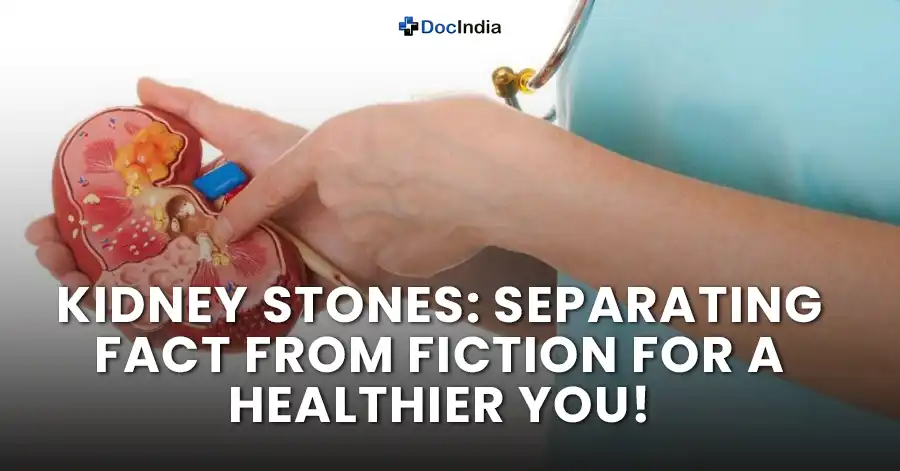Kidney Stones: Separating Fact from Fiction for a Healthier You!

Kidney Stone Myths Vs Facts: 7 Misconceptions That Can Take A Dangerous Turn
Kidney stones are a prevalent and excruciating ailment that impacts millions of individuals globally. Even while kidney stones are common, there are a few myths about them that might spread false information and have possibly harmful effects. In order to empower people to make knowledgeable decisions regarding their kidney health, let's dispel seven widespread misunderstandings around kidney stones.
Myth 1: Only Older Adults Get Kidney Stones
Fact: While it's true that the likelihood of getting kidney stones rises with age, kidney stones can afflict people of all ages, even young adults and toddlers. Kidney stones can develop at any age due to a variety of factors, including heredity, nutrition, and dehydration. Regardless of age, it is critical to understand the risk factors and take preventative action.
Myth 2: Drinking More Water Doesn't Prevent Kidney Stones
Fact: One of the main risk factors for kidney stones is dehydration. Urine that is concentrated due to dehydration can facilitate the crystallization of minerals and the formation of stones. Getting enough water into your system helps dilute urine and keeps minerals from building up. Drinking eight to ten glasses of water a day is advised by health professionals to stay properly hydrated and lower the incidence of kidney stones.
Myth 3: Calcium Intake Should Be Avoided to Prevent Kidney Stones
Fact: Avoiding calcium in order to prevent kidney stones is not a good idea because it is an essential mineral for bone health. In actuality, a diet lacking in calcium may make stones more likely to develop. The secret is to keep your consumption of calcium under check in relation to other dietary components. Overconsumption of foods high in oxalate, such nuts and beets, can lead to the development of stones. Kidney stone prevention requires both a proper amount of calcium in a well-balanced diet and enough water intake.
Myth 4: Kidney Stones Only Cause Pain, No Other Symptoms
Fact: While pain is a hallmark symptom of kidney stones, they can manifest with other symptoms as well. These may include blood in the urine (hematuria), frequent urination, cloudy or foul-smelling urine, and nausea/vomiting. In some cases, individuals may not experience any symptoms until the stones obstruct the urinary tract. Being aware of these symptoms is crucial for early detection and intervention, preventing potential complications.
Myth 5: Medications Alone Can Dissolve Kidney Stones
Fact: Contrary to popular belief, drugs cannot dissolve kidney stones on their own. Certain medications can help control pain and make it easier for tiny stones to pass through, but they can't get rid of larger stones or deal with the underlying issues that lead to stone formation. Depending on the size and nature of the stone, treatment options may involve dietary adjustments, lifestyle changes, and, in certain situations, surgical procedures. Seeking individualized guidance from a healthcare practitioner is imperative when considering specific circumstances.
Myth 6: Kidney Stones Are Always Sharp and Pointed
Fact: It's a popular misperception that kidney stones are pointed, sharp objects. Kidney stones actually come in a variety of shapes and textures. While some stones have sharp edges, others could be smooth. The degree of symptoms and the possibility of spontaneous passage can both be influenced by the stone's size and texture. Accurate diagnosis and efficient treatment of kidney stones depend on an understanding of the variety of their characteristics.
Myth 7: Kidney Stones Only Occur Once
Fact: Those who have had kidney stones are more likely to have them again, despite conventional assumption. A person is more likely to get kidney stones again in the future after having one. Numerous factors, such as heredity, eating practices, and underlying medical issues, can influence recurrence. It is imperative to take preventive measures, such as staying hydrated, eating a balanced diet, and getting frequent checkups from the doctor, to lower the risk of kidney stones happening again.
To sum up, preserving kidney health and averting potentially hazardous outcomes require debunking myths and comprehending the truth concerning kidney stones. People can make informed decisions about their nutrition, lifestyle, and general health by being aware of the facts about kidney stones. For individualized advice and suitable interventions, speak with a healthcare provider if you think you may have kidney stones or are at risk. Understanding kidney health is essential for both preventive and efficient management, as it plays a crucial role in overall wellbeing.
